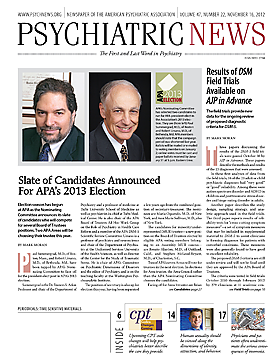Stigma remains a significant obstacle when members of the military weigh decisions about seeking mental health care, but it may not be the most significant one, according to an international group of researchers speaking at APA’s 2012 Institute on Psychiatric Services in New York last month.
“There’s a myth among the public that military personnel are overwhelmed by traumatic experience, are desperate for help but get pushed away by the mental health system, and face major stigma,” said Mark Zamorski, Ph.D., director of mental health for the Canadian Forces Health Services Group.
He spoke on a panel with other researchers from the Technical Cooperation Program, an international organization that collaborates on defense-related scientific and technical information exchanges and shared research activities among the United States, Great Britain, Canada, Australia, and New Zealand. U.S. participation is directed by the deputy assistant secretary of defense for research.
“However, the reality is different,” he said. “Troops are employed, like their jobs, are free of chronic medical problems, have unlimited health care coverage, and their employer pays the bills and reaps the benefits of their care.”
Nevertheless, they do not access care as often or as intensively as might be expected.
“Soldiers who are most in need of mental health care are also the ones who are less likely to ask for or receive care,” added Surgeon Commander Neil Greenberg, M.D., of Britain’s Royal Navy. Part of the reason is indeed stigma—their concern about how seeking or accepting care might negatively affect their careers or result in denigration by their fellow soldiers or officers.
And Greenberg noted that there has been only a modest decline in stigma despite the efforts of military high commands.
Rates of reported stigma against getting mental health care are twice as high during deployment, compared with the period afterward, he said. This is due to an “operational mindset” while at war that provides a sense of meaning and places a premium on readiness and group cohesion. It also implies that rates of stigma may vary depending on when they are measured—in the war zone or back home.
However, other factors also keep service members from treatment, said Amy Adler, Ph.D., of the Walter Reed Army Institute of Research.
Stigma—fear of being seen as “weak”—still exists but was actually less significant in predicting help seeking, said Adler, drawing on her study of 2,269 Army soldiers after their service in Afghanistan. Soldiers’ belief in self-reliance and their attitudes toward mental health treatment counted for a lot more.
More critically, soldiers who score high on a sense of self-reliance more often reject seeking help. Treatment is seen as a last resort, only after “I’ll handle it myself” fails. Many also say they “don’t trust” mental health professionals.
The trust issue arises repeatedly. It may reflect concerns that providers will report soldiers to the chain of command. Adler said that the matter is under study through an Army-funded grant to Thomas Britt, Ph.D., of Clemson University.
“Given that items such as ‘leadership might treat me differently’ or ‘my leaders would blame me for the problem’ are not falling on the same dimension as the trust item, it’s not immediately apparent that the concept is related to concerns about leadership,” said Adler in an interview.
In contrast, when questions were phrased positively, soldiers who said that “mental health treatment works” or that “it takes courage to get mental health treatment,” were more likely to seek care.
“A positive view of mental health treatment predicts greater treatment seeking, but higher scores on measures of self-reliance predict lower willingness,” she said. “If we focus only on stigma we’re going to have limited opportunities for intervention,”
More data came from a survey of 8,841 Canadian troops, which showed that still other factors than stigma contributed to patterns of help seeking, said Canada’s Deniz Fikretoglu, Ph.D., a defense scientist at the Canadian Institute for Military and Veteran Health Research in Toronto.
Earlier age of symptom onset and shorter time in the service predicted delay in using needed mental health services, she said. The survey also found that younger troops tended to seek care sooner than older ones did.
“Also, the higher the rank, the less likely they were to seek care, because they thought it would affect their subordinates’ perception of their leadership abilities and result in deaths among their troops,” said Fikretoglu.
“We have to look beyond the fear of stigma to the beliefs about the consequences of help seeking,” she said. “Troops have many more concerns.”
In addition, responses to questions about frequency and intensity of care suggested that troops were not getting adequate care, she added. “We should shift focus from access to quality of care.”

